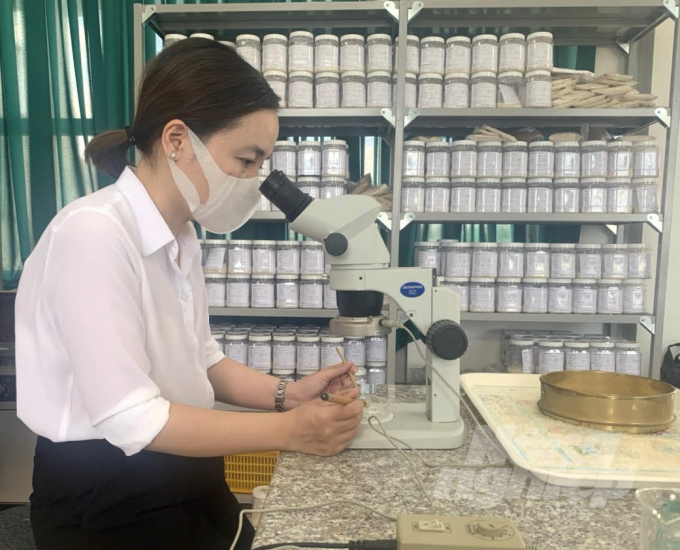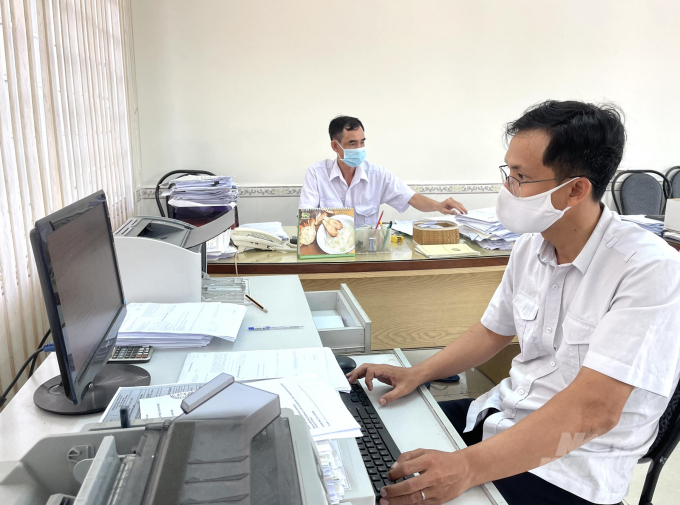June 17, 2025 | 05:44 GMT +7
June 17, 2025 | 05:44 GMT +7
Hotline: 0913.378.918
June 17, 2025 | 05:44 GMT +7
Hotline: 0913.378.918

Plant protection officers carrying out phytosanitary inspection in the Mekong Delta. Photo: HD.
The Mekong Delta is a key agricultural production area of the country, with a natural area of nearly 4 million hectares, of which arable area is about 2.1 million hectares and the rice-growing area alone is about 1.6 million hectares. Therefore, the Mekong Delta has always been a key region for the import and export of agricultural products in the country.
Over the years, stemming from production needs and practical conditions of production, business, and agricultural economic development in the region, in 1994, the Plant Protection Department of Region IX was established, performing its functions of Plant Protection under the Ministry of Agriculture and Rural Development.
Due to the characteristics of the Mekong Delta region with a relatively wide area, the East-Western sea and islands, the southwestern border adjacent to the Kingdom of Cambodia, stretching from Long An - Dong Thap - Kien Giang, the Plant Protection Department of Region IX was assigned the management of plant protection in 9 provinces and cities in the region, including Can Tho city and Hau Giang, An Giang, Kien Giang, Ca Mau, Bac Lieu, Tra Vinh, Soc Trang and Vinh Long.
Mr. Kha Huu Vinh, Head of the Plant Protection Department of Region IX, said that the Department follows the National Single Window administrative reform roadmap under the direction by the Ministry of Agriculture and Rural Development. The Department has strived to achieve many advances in plant protection activities, especially by simplifying administrative procedures, shortening time and creating favorable conditions for organizations and individuals in export-import activities.
According to Mr. Kha Huu Vinh, the order and procedures for plant protection for import, export, transit and post-import of objects subject to plant protection under Circular 33/2014/TT-BNN dated 30 October 2014. At the same time, the Department follows the direction by the Minister of Agriculture and Rural Development in reviewing, reducing the time for customs clearance of goods and ensuring transparency for businesses.

Reception and inspection of plant protection dossiers at the Plant Protection Department of Region IX. Photo: HD.
The Plant Protection Department has also issued a dispatch on publicizing the time of plant protection. In which, the maximum time from inspection to issuance of phytosanitary certificates for roads and airway travel is 4 hours and 10 hours for seaports. Thereby, innovation can be seen in the way of working, dedicated service of the officers and employees of the Department, creating the most favorable conditions for organizations and individuals to carry out plant protection procedures.
The Plant Protection Department of Region IX applies international standards on phytosanitary measures (ISPM), Vietnamese standards and basic standards on plant protection to carry out phytosanitary work.
By receiving feedback and suggestions from individuals, corporate clients, the majority of comments are satisfied with the administrative reform efforts by the Plant Protection Department of region IX.
That is to create favorable conditions and simplify administrative paperwork. Additionally, the inspection of food safety for imports and exports for goods of plant origin, and quality control of imported plant-based animal feeds and aqua feeds is carried out strictly according to regulations.
The Plant Protection Department of Region IX strives with dedication and professional service for the cause of agricultural development in the Mekong Delta.
Translated by Nguyen Hai Long

(VAN) The UNESCO Global Geopark revalidation of Non nuoc Cao Bang and the transition to a two-tier administrative model are presently undergoing a pivotal moment in Cao Bang, the northernmost province of Vietnam.
/2025/06/13/5330-2-004539_953.jpg)
(VAN) Changing policy mindset and removing investment barriers are urgent requirements to open up new development space for enterprises in the agricultural sector.

(VAN) The areas include the restoration of five million hectares of marine ecosystems.

(VAN) Dr. Le Van Nguyen, Director of the Institute of E-Commerce Management (ECM), emphasizes the potential for green development through the cultivation of fruit trees, particularly in provinces such as Son La.

(VAN) VAAS and numerous Vietnamese enterprises have signed cooperation agreements with Japanese partners to promote agricultural technology and trade connectivity.
/2025/05/29/5625-12-214801_567.jpg)
(VAN) Provincial mergers in the Mekong Delta promise to streamline administration, expand inter-provincial raw material areas, and foster close linkages in agricultural value chains, benefiting both businesses and cooperatives.

(VAN) Merging Mekong Delta provinces contributes to the expansion of agricultural raw material areas, addressing previous constraints caused by provincial boundaries. Additionally, this expansion will reduce costs and strengthen linkages between businesses, cooperatives, and farmers.